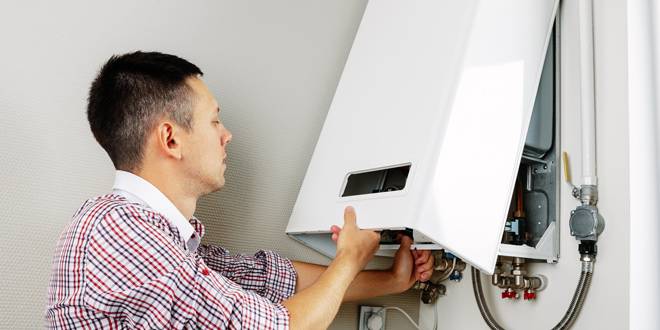Are you considering replacing your water heater with a high-efficiency model? Our Buyer’s Guide dives into the world of modern water heaters, offering expert advice on choosing a system that maximizes efficiency, reduces utility bills, and provides consistent, dependable hot water.
What is a High-Efficiency Water Heater?
A high-efficiency water heater is an advanced system designed to heat water using less energy compared to traditional models. These water heaters are engineered to minimize heat loss, maximize energy utilization, and reduce operational costs. They are characterized by their Energy Factor (EF) or Uniform Energy Factor (UEF) ratings, which measure their overall energy efficiency. The higher the EF or UEF rating, the more efficient the water heater.
Key Features of High-Efficiency Water Heaters
- Save On Energy Costs: These ENERGY STAR-certified systems consume significantly less energy, utilizing advanced heating technologies and better insulation, leading to lower energy bills and a reduced environmental impact.
- Advanced Heating Methods: High-efficiency water heaters often employ cutting-edge methods like condensing technology in gas heaters, where exhaust gases are reused to heat the water, or heat pump technology in electric models, which draw heat from the surrounding air.
- Improved Insulation: Enhanced insulation in these heaters reduces standby heat loss (the heat lost while the water is stored), ensuring the water stays hot for longer periods.
- Smart Controls: Many high-efficiency models come with intelligent controls that allow for better temperature regulation, scheduling, and even remote control for optimal performance and convenience.
- Environmentally Friendly: These systems often have a reduced carbon footprint due to lower energy consumption and, in the case of gas models, lower emissions.
- Longevity and Durability: High-efficiency water heaters are typically built with higher-quality materials and advanced technologies, contributing to a longer lifespan and greater reliability.
Types of High-Efficiency Water Heaters
Natural Gas Water Heaters
These capture and utilize exhaust gases that would otherwise escape, making them more efficient than traditional gas heaters.
Tankless Water Heaters
Also known as on-demand water heaters, these heat water directly without the use of a storage tank, leading to greater energy efficiency.
Heat Pump Water Heaters
These electric water heaters move heat from one place to another instead of generating heat directly, making them more efficient than standard electric heaters.
Solar Water Heaters
Using solar panels, these heaters are extremely efficient and environmentally friendly, though they require a suitable climate and may need a backup system.
Considerations When Choosing a High-Efficiency Water Heater
When selecting a high-efficiency water heater, several important factors must be considered to ensure that you make a choice that is not only cost-effective but also meets your household’s specific needs. Here’s a detailed look at these considerations:
1. Initial Cost vs. Long-Term Savings
Upfront Investment: High-efficiency water heaters often come with a higher price tag compared to standard models. This initial investment covers advanced technology and materials that contribute to the unit’s efficiency.
Energy Savings: These models are designed to use less energy, which translates to lower utility bills. Over time, the savings on your energy bills can offset the higher initial cost.
Incentives and Rebates: Look for available rebates and incentives from governments or manufacturers, which can reduce the initial cost and make high-efficiency models more affordable.
2. Size and Capacity
Household Demand: Assess your household’s hot water usage. A unit that is too large will lead to unnecessary energy consumption, whereas a unit that is too small won’t meet your hot water needs.
Space Constraints: Consider the space available for installation. Tankless models, for instance, are more compact and can save valuable space.
Peak Hour Demand: Calculate the peak hour demand – the amount of hot water your household uses during the busiest hour. This helps in selecting a unit that can handle your maximum hot water needs without running out.
3. Fuel Type
Gas Water Heaters: These are typically more efficient than traditional electric models and are a good choice if you have an existing gas line.
Electric Water Heaters: Electric models, like a heat pump water heater, are generally easier and cheaper to install but may have higher operating costs depending on your local electricity rates.
Solar Water Heaters: These are the most environmentally friendly option and can offer significant savings over time, but they require a higher initial investment and are dependent on your geographical location.
4. Energy Efficiency Ratings
Energy Factor (EF) and Uniform Energy Factor (UEF): These ratings indicate the water heater’s overall efficiency. A higher rating means better efficiency.
First Hour Rating (FHR): This measures the volume of hot water the unit can deliver in an hour. Ensure the FHR meets your peak-hour demand.
5. Installation and Maintenance
Professional Installation: Proper installation by a qualified professional is crucial for the safe and efficient operation of the unit.
Maintenance Requirements: Regular maintenance can extend the life of your water heater and ensure it operates at peak efficiency. Understand the maintenance requirements of the model you choose.
6. Environmental Considerations
Reduced Carbon Footprint: By choosing a high-efficiency water heater, you’re not only saving on costs but also contributing to a reduction in overall carbon emissions.
Sustainability: Consider the long-term environmental impact of your choice. For instance, solar water heaters are a more sustainable option over the long term.
7. Technology and Features
Smart Features: Some high-efficiency water heaters come with smart technology, such as Wi-Fi connectivity, allowing for remote monitoring and control.
Safety Features: Look for models with enhanced safety features like automatic shut-off in case of a malfunction.
In summary, selecting a high-efficiency water heater involves balancing cost, efficiency, capacity, and personal needs. By carefully considering these factors, you can choose a water heater that not only provides you with continuous hot water but also does so in the most energy-efficient and cost-effective manner possible.
Take the Next Step with Zen Air Heating & Cooling 🌿🏡
Ready to embrace efficiency and comfort in your home? Contact us today to explore our range of high-efficiency water heaters. Let us help you find the perfect solution tailored to your needs, ensuring you enjoy consistent hot water and energy savings. Act now to upgrade your home’s water heating system – a decision that promises both immediate satisfaction and long-term benefits. Your journey to optimal home comfort starts here!




